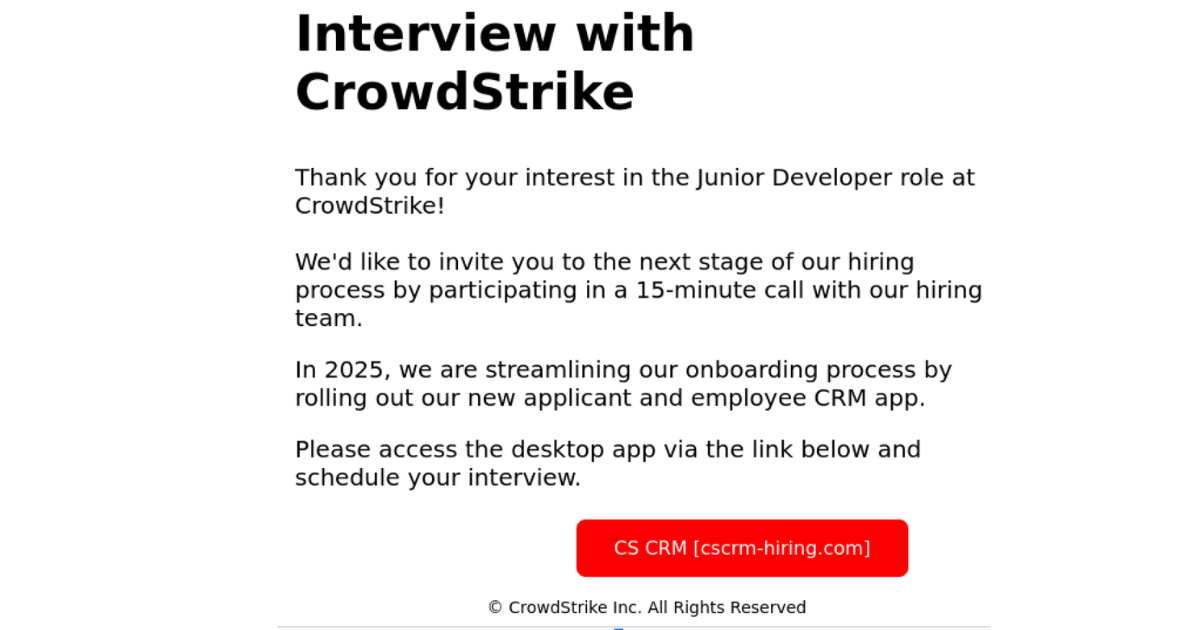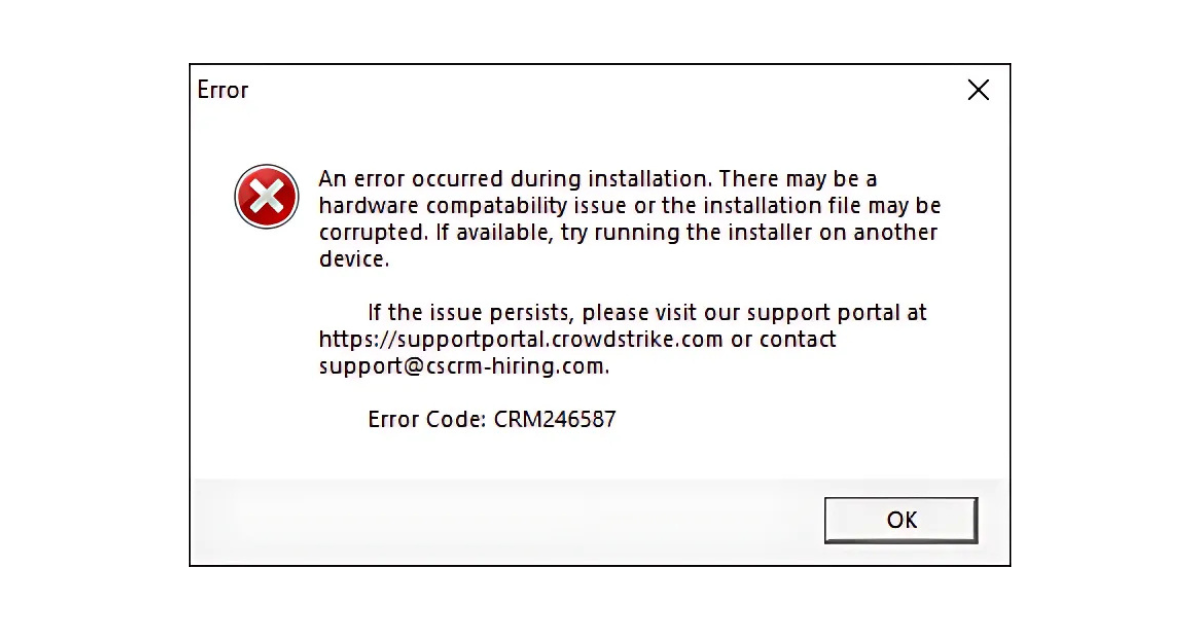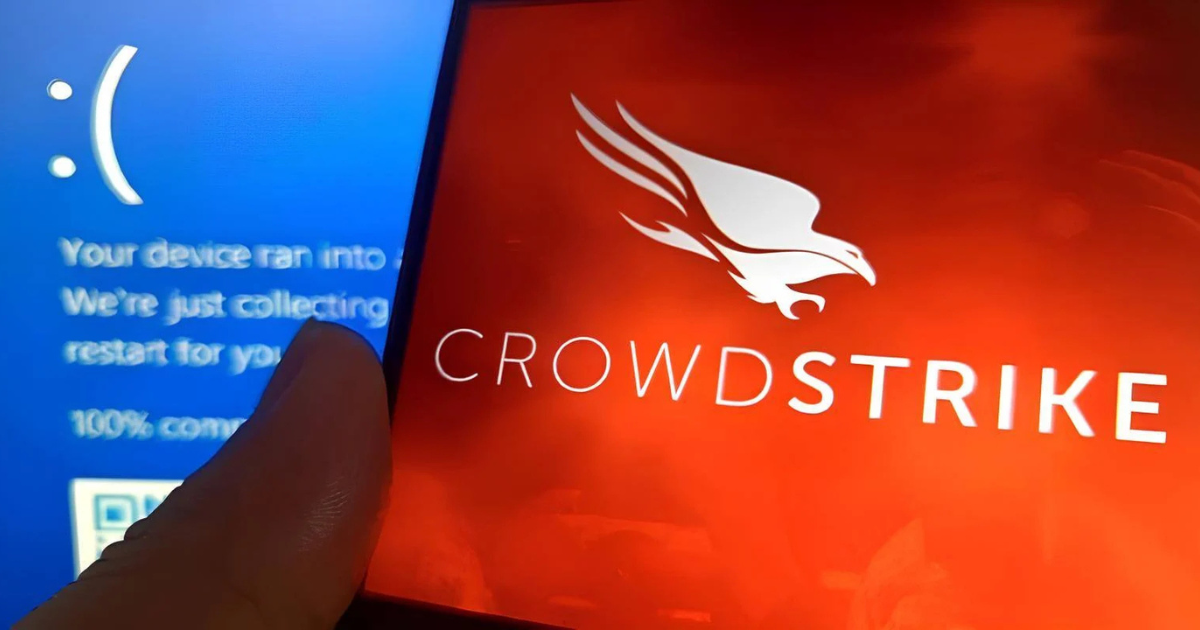CrowdStrike, the cybersecurity leader, finds that a phishing operation aimed at employment seekers is employing cryptocurrency mining malware. Scammers impersonate CrowdStrike’s hiring team to lure candidates and download the malicious software. The aim of this new scheme is to install XMRig, a Monero cryptocurrency mining program, onto victims’ computers.
Key-Takeaways:
- CrowdStrike’s recruitment team is being scammed by scammers who impersonate them and spread XMRig cryptocurrency mining malware under the guise of fake job offers.
- Attackers set up both a fraudulent website and fake CRM application to install malicious software that mines Monero cryptocurrency.
- Recruitment does not involve software downloads should job seekers confirm all recruiting communications via official channels.
How the Scam Works
 Their first step is to send them fake emails that are purporting to be recruitment emails from CrowdStrike’s hiring department. Resources point job seekers to a website that looks legitimate but really isn’t. The scam website, which goes by the domain cscrm-hiring.com, views people as visitors and, using that, persuades them to go on and download, so to speak, what it calls an employee CRM application. But this download actually comes with the XMRig mining software already installed by an actual virus that embeds in your computer system.
Their first step is to send them fake emails that are purporting to be recruitment emails from CrowdStrike’s hiring department. Resources point job seekers to a website that looks legitimate but really isn’t. The scam website, which goes by the domain cscrm-hiring.com, views people as visitors and, using that, persuades them to go on and download, so to speak, what it calls an employee CRM application. But this download actually comes with the XMRig mining software already installed by an actual virus that embeds in your computer system.
Technical Details of the Attack
 It runs a few system checks that are designed so that security software can’t easily detect it. Instead of installing in the front, users see a fake error, and then the actual thing happens in the background. The XMRig miner, once installed on your machine, starts to use it’s resources to mine Monero cryptocurrency. Since this is unauthorized mining, this can really slow down your victim’s computer and cost them as well on electricity.
It runs a few system checks that are designed so that security software can’t easily detect it. Instead of installing in the front, users see a fake error, and then the actual thing happens in the background. The XMRig miner, once installed on your machine, starts to use it’s resources to mine Monero cryptocurrency. Since this is unauthorized mining, this can really slow down your victim’s computer and cost them as well on electricity.
According to CrowdStrike, neither the actual recruitment process requires candidates to download any software. If you receive unexpected job offers or requests to download applications, job seekers should be especially careful. By looking for suspicious domain names and unusual software download requests, you can help avoid getting conned this way.
Historical Context and Similar Attacks
 Like in numerous other cases, cybercriminals are resorting to job offers as bait for crypto-related attacks. In 2022, an example was Lazarus Group, a North Korean hacking team, which used similar tactics. The Ronin Network is under attack from a cryptocurrency mining malware with a malicious PDF, which resulted in the theft of $600 million in cryptocurrency.
Like in numerous other cases, cybercriminals are resorting to job offers as bait for crypto-related attacks. In 2022, an example was Lazarus Group, a North Korean hacking team, which used similar tactics. The Ronin Network is under attack from a cryptocurrency mining malware with a malicious PDF, which resulted in the theft of $600 million in cryptocurrency.
The latest is a new campaign stroking increasing sophistication of the cyber threats related to cryptocurrency. Social engineering tactics are becoming more and more appealing to criminals who take advantage of job seekers believing in well-known companies. Here, the fake job offers and cryptocurrency mining combined are a particularly dangerous threat.
Protection Measures and a Call for Action
 Verification of all recruitment communications can only be done through verified official channels of the company. That’s why you have to double check email addresses and website domains before doing anything. Clear communication of one’s own hiring process, as well as not getting any software download requests from any companies, should too be done by companies.
Verification of all recruitment communications can only be done through verified official channels of the company. That’s why you have to double check email addresses and website domains before doing anything. Clear communication of one’s own hiring process, as well as not getting any software download requests from any companies, should too be done by companies.
Crypto scams through this recruitment are becoming a serious trend in offensive matters. Until cryptocurrency mining remains profitable, similar variants in these attacks will continue to show up. Educating your communities about these ever-evolving threats is a must, but also organizations must stay vigilant.
If you’ve gotten any suspicious recruitment emails from CrowdStrike telling you to click and join their team, share them with their security team. However, always double check job opportunities through official company websites and legitimate recruitment platforms and ensure that you receive 법률 or subpoena from the courts, where required. Don’t forget that real companies do not require candidates to download unidentified software during the hiring process.
Conclusion: Cryptocurrency Mining Malware
This phishing campaign discovery is a lesson to always keep up to date with digital security awareness. Employment seekers have to be on their guard for unexpected employment opportunities. For the safety of potential candidates, companies should be updating their security measures constantly and also conduct transparent recruitment processes.











